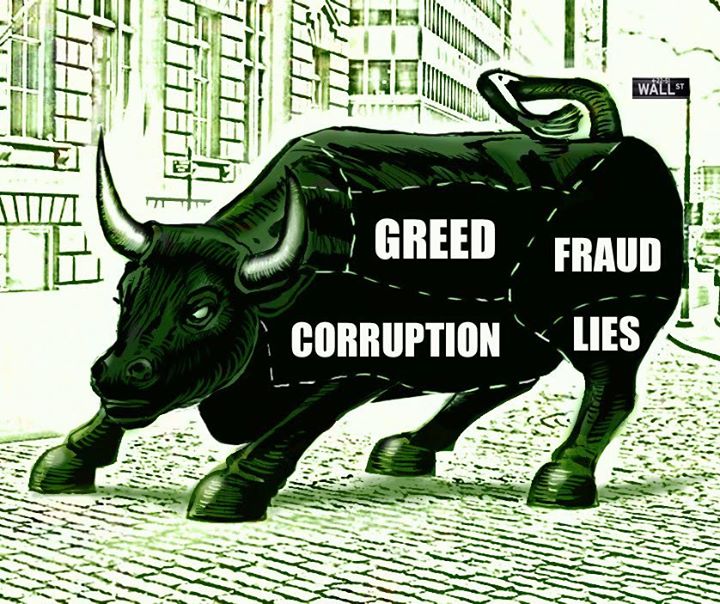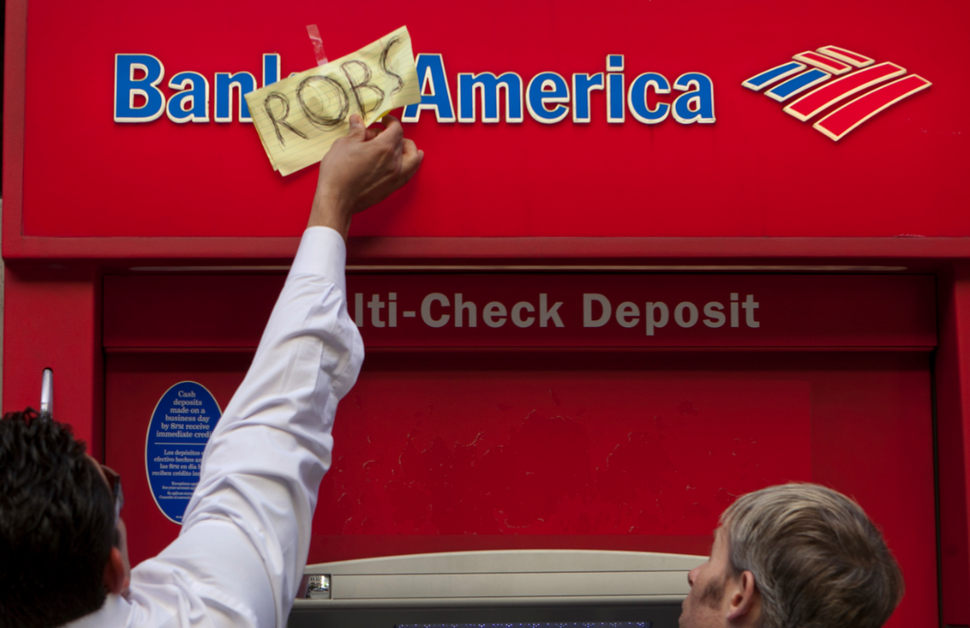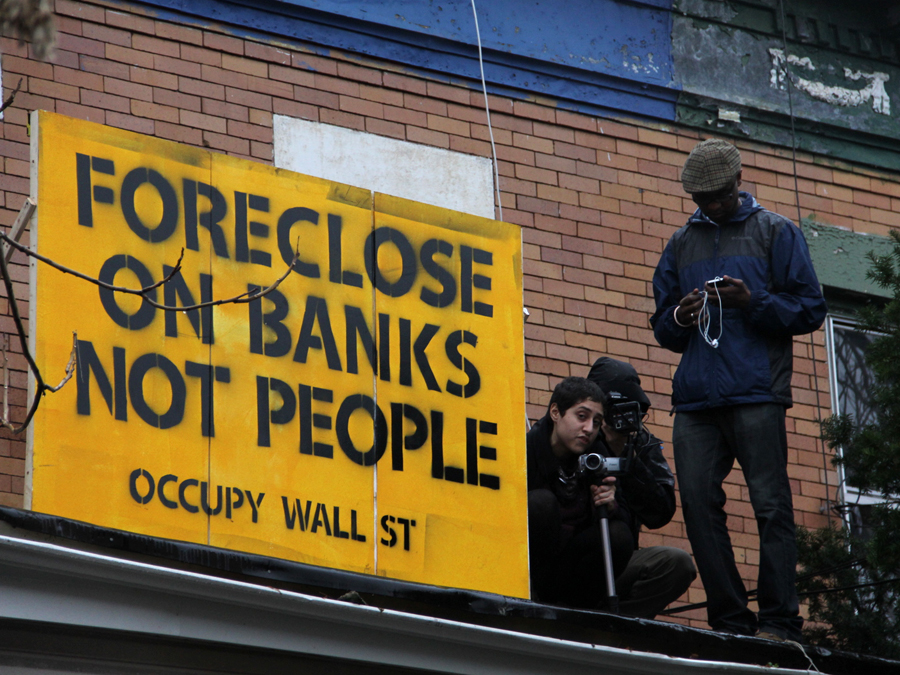Giant bank holding companies now own airports, toll roads, and ports; control power plants; and store and hoard vast quantities of commodities of all sorts. They are systematically buying up or gaining control of the essential lifelines of the economy. How have they pulled this off, and where have they gotten the money?
In a letter to Federal Reserve Chairman Ben Bernanke dated June 27, 2013, U.S. Representative Alan Grayson and three co-signers expressed concern about the expansion of large banks into what have traditionally been non-financial commercial spheres. Specifically:
"[W]e are concerned about how large banks have recently expanded their businesses into such fields as electric power production, oil refining and distribution, owning and operating of public assets such as ports and airports, and even uranium mining."
After listing some disturbing examples, they observed:
"According to legal scholar Saule Omarova, over the past five years, there has been a “quiet transformation of U.S. financial holding companies.” These financial services companies have become global merchants that seek to extract rent from any commercial or financial business activity within their reach. They have used legal authority in Graham-Leach-Bliley to subvert the 'foundational principle of separation of banking from commerce'. . . . "It seems like there is a significant macro-economic risk in having a massive entity like, say JP Morgan, both issuing credit cards and mortgages, managing municipal bond offerings, selling gasoline and electric power, running large oil tankers, trading derivatives, and owning and operating airports, in multiple countries."
A “macro” risk indeed – not just to our economy but to our democracy and our individual and national sovereignty. Giant banks are buying up our country’s infrastructure – the power and supply chains that are vital to the economy. Aren’t there rules against that? And where are the banks getting the money?
How Banks Launder Money Through the Repo Market
In an illuminating series of articles on Seeking Alpha entitled “Repoed!”, Colin Lokey argues that the investment arms of large Wall Street banks are using their “excess” deposits – the excess of deposits over loans – as collateral for borrowing in the repo market. Repos, or “repurchase agreements,” are used to raise short-term capital. Securities are sold to investors overnight and repurchased the next day, usually day after day.
The deposit-to-loan gap for all U.S. banks is now about $2 trillion, and nearly half of this gap is in Bank of America, JP Morgan Chase, and Wells Fargo alone. It seems that the largest banks are using the majority of their deposits (along with the Federal Reserve’s quantitative easing dollars) not to back loans to individuals and businesses but to borrow for their own trading.
Acquiring a company or a portion of a company mostly with borrowed money is called a “leveraged buyout.” The banks are leveraging our money to buy up ports, airports, toll roads, power, and massive stores of commodities.
Using these excess deposits directly for their own speculative trading would be blatantly illegal, but the banks have been able to avoid the appearance of impropriety by borrowing from the repo market. (See my earlier article.) The banks’ excess deposits are first used to purchase Treasury bonds, agency securities, and other highly liquid, “safe” securities. These liquid assets are then pledged as collateral in repo transactions, allowing the banks to get “clean” cash to invest as they please. They can channel this laundered money into risky assets such as derivatives, corporate bonds, and equities (stock).
That means they can buy up companies. Lokey writes, “It is common knowledge that prop [proprietary] trading desks at banks can and do invest in a variety of assets, including stocks.” Prop trading desks invest for the banks’ own accounts. This was something that depository banks were forbidden to do by the New Deal-era Glass-Steagall Act but that was allowed in 1999 by the Gramm-Leach-Bliley Act, which repealed those portions of Glass-Steagall.
The result has been a massively risky $700-plus trillion speculative derivatives bubble. Lokey quotes from an article by Bill Frezza in the January 2013 Huffington Post titled "Too-Big-To-Fail Banks Gamble With Bernanke Bucks":
If you think [the cash cushion from excess deposits] makes the banks less vulnerable to shock, think again. Much of this balance sheet cash has been hypothecated in the repo market, laundered through the off-the-books shadow banking system. This allows the proprietary trading desks at these "banks" to use that cash as collateral to take out loans to gamble with. In a process called hyper-hypothecation this pledged collateral gets pyramided, creating a ticking time bomb ready to go kablooey when the next panic comes around.
That Explains the Mountain of Excess Reserves
Historically, banks have attempted to maintain a loan-to-deposit ratio of close to 100%, meaning they were “fully loaned up” and making money on their deposits. Today, however, that ratio is only 72% on average; and for the big derivative banks, it is lower yet. The unlent portion represents the “excess deposits” available to be tapped as collateral for the repo market.
The Fed’s quantitative easing contributes to this collateral pool by converting less-liquid mortgage-backed securities into cash in the banks’ reserve accounts. This cash is not something the banks can spend for their own proprietary trading, but they can invest it in “safe” securities – Treasuries and similar securities that are also the sort of collateral acceptable in the repo market.
Using this repo collateral, the banks can then acquire the laundered cash with which they can invest or speculate for their own accounts.
Lokey notes that U.S. Treasuries are now being bought by banks in record quantities. These bonds stay on the banks’ books for Fed supervision purposes, even as they are being pledged to other parties to get cash via repo. The fact that such pledging is going on can be determined from the banks’ balance sheets, but it takes some detective work. Explaining the intricacies of this process, the evidence that it is being done, and how it is hidden in plain sight takes Lokey three articles, to which the reader is referred. Suffice it to say here that he makes a compelling case.
Can They Do That?
Countering the argument that “banks can’t really do anything with their excess reserves” and that “there is no evidence that they are being rehypothecated,” Lokey points to data coming to light in conjunction with JPMorgan’s $6 billion “London Whale” fiasco. He calls it “clear-cut proof that banks trade stocks (and virtually everything else) with excess deposits.” JPM’s London-based Chief Investment Office [CIO] reported:
"JPMorgan's businesses take in more in deposits that they make in loans and, as a result, the Firm has excess cash that must be invested to meet future liquidity needs and provide a reasonable return. The primary reponsibility of CIO, working with JPMorgan's Treasury, is to manage this excess cash. CIO invests the bulk of JPMorgan's excess cash in high credit quality, fixed income securities, such as municipal bonds, whole loans, and asset-backed securities, mortgage backed securities, corporate securities, sovereign securities, and collateralized loan obligations."
Lokey comments:
"That passage is unequivocal -- it is as unambiguous as it could possibly be. JPMorgan invests excess deposits in a variety of assets for its own account and as the above clearly indicates, there isn't much they won't invest those deposits in. Sure, the first things mentioned are "high quality fixed income securities," but by the end of the list, deposits are being invested in corporate securities [stock] and CLOs [collateralized loan obligations]. . . . [T]he idea that deposits are invested only in Treasury bonds, agencies, or derivatives related to such "risk free" securities is patently false."
He adds:
"It is no coincidence that stocks have rallied as the Fed has pumped money into the coffers of the primary dealers while ICI data shows retail investors have pulled nearly a half trillion from U.S. equity funds over the same period. It is the banks that are propping stocks."
Another Argument for Public Banking
All this helps explain why the largest Wall Street banks have radically scaled back their lending to the local economy. It appears that their loan-to-deposit ratios are low not because they cannot find creditworthy borrowers but because they can profit more from buying airports and commodities through their prop trading desks than from making loans to small local businesses.
Small and medium-sized businesses are responsible for creating most of the jobs in the economy, and they are struggling today to get the credit they need to operate. That is one of many reasons that we the people need to own some banks ourselves. Publicly-owned banks can direct credit where it is needed in the local economy; can protect public funds from confiscation through “bail-ins” resulting from bad gambling in by big derivative banks; and can augment public coffers with banking revenues, allowing local governments to cut taxes, add services, and salvage public assets from fire-sale privatization.
Publicly-owned banks have a long and successful history, and recent studies have found them to be the safest in the world.
As Representative Grayson and co-signers observed in their letter to Chairman Bernanke, the banking system is now dominated by “global merchants that seek to extract rent from any commercial or financial business activity within their reach.” They represent a return to a feudal landlord economy of unearned profits from rent-seeking. We need a banking system that focuses not on casino profiteering or feudal rent-seeking but on promoting economic and social well-being; and that is the mandate of the public banking sector globally.
For a PublicBankingTV video on the bail-in threat, go here.
Ellen Brown is an attorney, president of the Public Banking Institute, and author of twelve books including the best-selling Web of Debt. InThe Public Bank Solution, her latest book, she explores successful public banking models historically and globally.
3 WAYS TO SHOW YOUR SUPPORT
- Log in to post comments


















